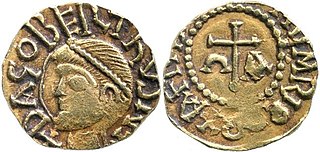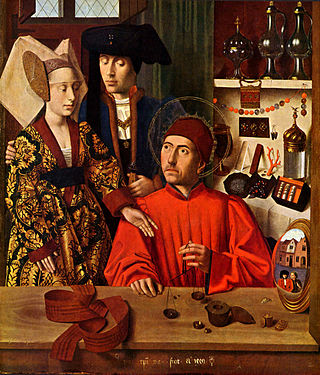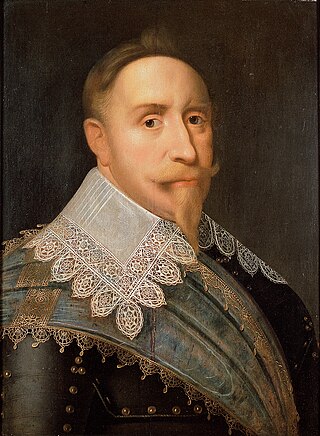Food
- Dagobert (sandwich), a sandwich of Belgian cuisine
| Gender | Male |
|---|
Dagobert or Taginbert is a Germanic male given name, possibly from Old Frankish Dag "day" and beraht "bright". Alternatively, it has been identified as Gaulish dago "good" berxto "bright".

The Merovingian dynasty was the ruling family of the Franks from around the middle of the 5th century until 751. They first appear as "Kings of the Franks" in the Roman army of northern Gaul. By 509 they had united all the Franks and northern Gallo-Romans under their rule. They conquered most of Gaul, defeating the Visigoths (507) and the Burgundians (534), and also extended their rule into Raetia (537). In Germania, the Alemanni, Bavarii and Saxons accepted their lordship. The Merovingian realm was the largest and most powerful of the states of western Europe following the breakup of the empire of Theodoric the Great.
Sigismund is a German proper name, meaning "protection through victory", from Old High German sigu "victory" + munt "hand, protection". Tacitus latinises it Segimundus. There appears to be an older form of the High German word "Sieg" (victory): sigis, obviously Gothic and an inferred Germanic form, and there is a younger form: sigi, which is Old Saxon or Old High German sigu. A 5th century Prince of Burgundy was known both as Sigismund and Sigimund . Its Hungarian equivalent is Zsigmond.

Ferdinand is a Germanic name composed of the elements farð "journey, travel", Proto-Germanic *farthi, abstract noun from root *far- "to fare, travel", and nanth "courage" or nand "ready, prepared" related to Old High German nendan "to risk, venture."

Austrasia was the northeastern kingdom within the core of the Frankish Empire during the Early Middle Ages, centring on the Meuse, Middle Rhine and the Moselle rivers. It included the original Frankish-ruled territories within what had been the northernmost part of Roman Gaul, and cities such as Cologne, Trier and Metz. It also stretched beyond the old Roman borders on the Rhine into Frankish areas which had never been formally under Roman rule. It came into being as a part of the Frankish Empire founded by Clovis I (481–511). At the same time, the initial powerbase of Clovis himself was the more Romanized part of northern Gaul, lying southwest of Austrasia, which came to be known as Neustria.

Dagobert I was King of the Franks. He ruled Austrasia (623–634) and Neustria and Burgundy (629–639). He has been described as the last king of the Merovingian dynasty to wield real royal power, after which the Mayor of the palace rose as the political and war leader. Dagobert was the first Frankish king to be buried in the royal tombs at the Basilica of Saint-Denis.

Regino of Prüm or of Prum was a Benedictine monk, who served as abbot of Prüm (892–99) and later of Saint Martin's at Trier, and chronicler, whose Chronicon is an important source for late Carolingian history.

Dagobert was the first Archbishop of Pisa and the second Latin Patriarch of Jerusalem after the city was captured in the First Crusade.

The Kingdom of the Franks, also known as the Frankish Kingdom, the Frankish Empire or Francia, was the largest post-Roman barbarian kingdom in Western Europe. It was ruled by the Frankish Merovingian and Carolingian dynasties during the Early Middle Ages. Francia was among the last surviving Germanic kingdoms from the Migration Period era.

Hubert is a Germanic masculine given name, from hug "mind" and beraht "bright". It also occurs as a surname.

Eligius, venerated as Saint Eligius, was a Frankish goldsmith, courtier, and bishop who was chief counsellor to Dagobert I and later Bishop of Noyon–Tournai. His deeds were recorded in Vita Sancti Eligii, written by his friend Audoin of Rouen.

Theuderic III was King of the Franks in the 7th century. He ruled Neustria and Burgundy on two occasions, as well as Austrasia from 679 until his death in 691.

Sigebert III was the Merovingian king of Austrasia from 633 to his death around 656. He was described as the first Merovingian roi fainéant —do-nothing king—, in effect the mayor of the palace ruling the kingdom throughout his reign. However he lived a pious Christian life and was later sanctified, being remembered as Saint Sigebert of Austrasia in the Roman Catholic Church and Eastern Orthodox Church.

Dagobert III was Merovingian king of the Franks (711–715).

Childebert III, called the Just, was the son of Theuderic III and Chrothildis and sole king of the Franks (694–711). He was seemingly but a puppet of the mayor of the palace, Pepin of Heristal, though his placita show him making judicial decisions of his own will, even against the Arnulfing clan. His nickname has no comprehensible justification except possibly as a result of these judgements, but the Liber Historiae Francorum calls him a "famous man" and "the glorious lord of good memory, Childebert, the just king."

Gustav, also spelled Gustaf, is a male given name of likely Old Swedish origin, used mainly in Scandinavian countries, German-speaking countries, and the Low Countries, possibly meaning "staff of the Geats or Goths or gods", possibly derived from the Old Norse elements Gautr ("Geats"), Gutar/Gotar ("Goths") or goð ōs ("gods"), and stafr ("staff"). Another etymology speculates that the name may be of Medieval Slavic origin, from the name Gostislav, a compound word for "glorious guest", from the Medieval Slavic words gosti ("guest") and slava ("glory") and was adopted by migrating groups north and west into Germany and Scandinavia. This name has been borne by eight Kings of Sweden, including the 16th-century Gustav Vasa and the current king, Carl XVI Gustaf. It is a common name for Swedish monarchs since the reign of Gustav Vasa. The name has entered other languages as well. In French it is Gustave; in Italian, Portuguese, and Spanish it is Gustavo. The Latinized form is Gustavus. A side-form of the name in Swedish is Gösta. The name in Finnish is Kustaa, while in Icelandic it is written Gústav or Gústaf.
Herbert is a Germanic given name, from harja- "army", "warrior" or "noble, sublime", and beraht "bright" or "shining". See also Heribert and Aribert, other given names with the same roots.

Judicael or Judicaël (Welsh:Ithel), also spelled Judhael, was the King of Domnonée, part of Brittany, in the mid-7th century and later revered as a Roman Catholic saint.

Arnold is a masculine German, Dutch and English given name. It is composed of the Germanic elements arn "eagle" and wald "power, brightness". The name was first recorded in Francia from about the 7th century, at first often conflated with the name Arnulf, as in the name of bishop Arnulf of Metz, also recorded as Arnoald. Arnulf appears to be the older name, and German (Frankish) Arnold may have originally arisen in c. the 7th century as a corruption of Arnulf, possibly by conflation of similar names such as Hari-wald, Arn-hald, etc.

Heinrich is a German given name of ancient Germanic origin and cognate of Henry. Female forms are Henrike and Henriette. The most famous patron saint is Henry, as the German Emperor Henry II.
Brunulphe II or Brunulphe II of the Ardennes also called the Younger, was a Frankish nobleman and Merovingian Count of the Ardennes.